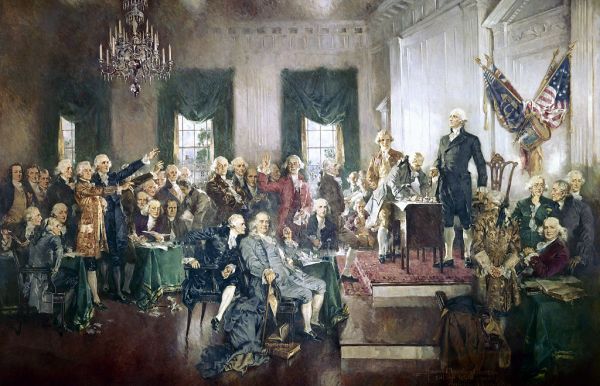America is hopelessly polarized and dysfunctional, and the Constitution is to blame—at least that’s what generations of progressive critics have argued. The onerous amendment process, the first-past-the-post elections, the unrepresentative Senate, the counter-majoritarian Supreme Court, and the idiosyncratic Electoral College are all, in their own pernicious ways, crippling our political life and driving us apart.
Not so, insists Yuval Levin in his timely and persuasive new book, American Covenant. In his telling, the Constitution is not failing us; we are failing the Constitution. The exasperating eccentricities and endless veto points in our national charter are frustrating if your goal is a swift, complete political victory. But the Founders didn’t set up the Constitution for parliamentary-style majoritarian triumph. Instead, by design, the Constitution forces compromise and bargaining. It’s not just a legal and institutional framework; it’s also what Levin calls “a framework for union and for solidarity” that, if reclaimed, can help unify our fractured politics.
American Covenant’s approach is methodical. After a few framing chapters, Levin walks through the Constitution’s institutional components: federalism, the three branches of government, and political parties. (He notes that party politics were not part of the Founders’ vision, but that parties nonetheless came to be an invaluable part of the country’s political structure.) These chapters each follow a pattern: a description of how the Founders designed things to work and how that furthered unity; a fall from grace as we neglected that design; and finally, a few specific prescriptions.
For example, consider the chapter on Congress. Levin explains that although the Founders saw Congress as the chief branch of government, they also worried that the legislature could advance majoritarian tyranny. So, they created strong and independent executive and judicial departments and split the legislature into the House and the Senate. The more representative House forces people with divergent political views “to deal with one another and so build some common ground.” Meanwhile, the Senate preserves “the regional balance of our national politics” and therefore compels geographically broader compromises. The institutional heart of Congress is, then, not empowering majorities, but making it impossible to do anything without compromise.
Yet Congress’ accommodation-forcing structures have long drawn criticism—including from Woodrow Wilson, a recurrent villain of American Covenant. Wilson dismissed Congress as ineffective, writing that the “more power is divided, the more irresponsible it becomes.” Better to empower democratic majorities and the experts who can facilitate their will, he thought. The constitutional structure of Congress did not change in response to this progressive critique, but our political culture did. Democrats and Republicans alike now take power and try to jam through partisan measures, only to see the opposite party win in the next cycle and attempt to reverse those changes in an equally partisan fashion. This partisan, majoritarian politics is what Wilson wanted, Levin suggests—but Wilsonian politics runs counter to the ideals of our Madisonian Constitution.
Levin proposes a few ways to reform our political culture to match the Constitution’s requirements for cross-partisan settlement. House and Senate rules should change to give Congressional committees more power to advance legislation, and party leaders less. Committees should have more private work sessions outside the eye of the television cameras that turn every Congressional hearing into an agitprop studio. Most dramatically, the House should be bigger—to the tune of 150 new members.
Levin’s prescriptions are convincing enough: If adopted, we would surely be a more unified, functional country. But there is a tension at the heart of American Covenant.
In a 2013 article for the University of Chicago Law Review, professors Eric Posner and Adrian Vermeule observed that much writing about constitutional law suffers from what they dubbed the “inside-outside fallacy.” Many an article will, on the one hand, adopt an external, diagnostic perspective on some political problem, critiquing and condemning the choices and motivations of actors within the political system. But then, when it is time to describe reforms, the article slips into an inside-the-system perspective and supplies proposals that rely on those very same actors to adopt a public-spirited outlook.
American Covenant often has just this structure. Levin laments the growth of administrative agencies and the tendency of presidents to use that agency power to unilaterally “legislate” when Congress declines to do so. He also worries that presidents are “treating the office as a stage for mass performance” rather than as a sober institution. In a divided time, presidents can no longer “speak on behalf of a unified public,” and so instead speak “for their particular partisans,” using the office “to intensify our divisions.”
Yet several suggestions for presidential reform would need to be implemented by the very presidents who are stoking divisions. Levin proposes a White House-led initiative to require greater clarity from regulatory agencies about the statutory authorizations for their actions. He also writes that presidents should “pull back their rhetoric and reground their self-understanding in the character of the executive’s work.” But it’s not clear why partisan pot-stirrers or pen-and-phone administrators would be interested in such changes.
To be fair, Levin does argue that improving the presidency begins not with the president but with a revitalized Congress. And yet, with Congress, the “inside-outside” tension remains. On one hand, “Congress is weak, simply put, because its members want it to be weak.” On the other, reforms like rejuvenating committees or expanding the size of the House depend on exactly those self-interested members to act for the good of the institution as a whole.
Could the courts save us? Levin seems to think they could help, but it is here that the inside-outside tension becomes most acute. For decades, judicial conservatives, recognizing the dangers of self-assured lawyers with lifetime appointments, pursued a project of judicial restraint. As the late Justice Antonin Scalia wrote decades ago, “the main danger” of constitutional interpretation “is that the judges will mistake their own predilections for the law.” Levin embraces this project, insisting on a “renewed judicial republicanism” that prioritizes “the work of the legislature over the substantive preferences of judges.” He also worries about the conservatives who are having second thoughts about judicial restraint, especially now that the Supreme Court has a Republican-appointed majority.
Still, for someone who worries about past judicial activism, Levin has remarkable faith in the judges of the future. Judges should recognize that Congress, not the Supreme Court, is at the center of our constitutional structure. But courts should also, Levin argues, be heavy-handed in policing that constitutional structure, perhaps by requiring that Congress be clearer in its delegations to the executive branch and by insisting that independent agencies like the Securities and Exchange Commission and the Federal Trade Commission be more accountable to the president.
On this theory, Congress would have no option but to be revitalized, since it would no longer be able to pass its responsibilities off to the labyrinthine federal bureaucracy. Yet this is an empirical claim about how legislatures respond to judicial decisions—one that runs into some contrary evidence. Consider, for example, one study that examined states whose courts aggressively police delegations to state agencies. It found that when state courts invalidated laws for delegating too broadly, this often had little effect on the behavior of the state legislature—and could even be counterproductive, with some legislatures responding by writing vaguer, rather than more precise statutes.
More fundamentally, why would judges, with all the self-aggrandizing institutional incentives that infuriated conservatives in the past, become selfless guardians of the constitutional order today? If Congress is supreme, why not defer to Congress’ judgments about constitutional structure, including about controversial questions like broad delegations or independent agencies? It’s not like it’s easy to tell whether judges are getting things right. As Levin concedes in his understated way, “in the hardest cases, which tend to matter the most,” the Constitution’s original meaning may suffer from “a lack of clarity.” Inside-outside dilemmas like this are common in American Covenant: The book’s proposed reforms, while often meritorious, usually depend on the buy-in or support of the very people least likely to adopt the reforms—or most likely to misuse the power.
A more actionable book might have focused on proposals where the institutions charged with restoring the constitutional order had incentives that aligned with the suggested reforms. Perhaps, for example, the states—so often jealous of their political and parochial interests—should be the ones taking the lead. Maybe discordant state action on issues where Congress has failed to respond to contemporary challenges can force the kind of national compromises that Levin hopes for. (In a chaotic way, one might see something like this as happening now, with California embracing tough climate policies or Texas freelancing on immigration law.) But finding those workable alternatives is hard, and Levin deserves ample credit for charting a possible path forward, even if it is an unlikely one.
In its first sentence, American Covenant promises that it is a “hopeful” book. And it is: The book distills the Framers’ wise and subtle constitutional vision, and it convincingly shows that America would be a better-governed and more unified country if our politicians, judges, and presidents embraced it. But they haven’t.
In that way, at least for the pessimist, there’s an unavoidably discouraging side to American Covenant. Thoughtful arguments, persuasively presented, prevail all too rarely. Still, if any book might break through, it is Yuval Levin’s.






Please note that we at The Dispatch hold ourselves, our work, and our commenters to a higher standard than other places on the internet. We welcome comments that foster genuine debate or discussion—including comments critical of us or our work—but responses that include ad hominem attacks on fellow Dispatch members or are intended to stoke fear and anger may be moderated.
With your membership, you only have the ability to comment on The Morning Dispatch articles. Consider upgrading to join the conversation everywhere.